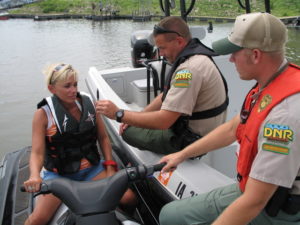As summer approaches, one of the outdoor activities enjoyed most by Wake County citizens is boating. Whether on Lake Jordan, Lake Wheeler, Falls Lake, or one of our area’s other smaller lakes or rivers, boating is usually accompanied by drinking alcoholic beverages. It is important to remember that combining these two activities could possibly lead to a serious criminal charge: Boating While Impaired (BWI).

North Carolina General Statute (N.C.G.S.) 75A-10(b1) describes the elements for Boating While Impaired. It reads:
No person shall operate any vessel while underway on the waters of this State:
1. While under the influence of an impairing substance, or
2. After having consumed sufficient alcohol that the person has, at any relevant time after the boating, an alcohol concentration of 0.08 or more.
Additionally, N.C.G.S. 75A-10(b) states:
No person shall manipulate any water skis, surfboard, non-motorized vessel, or similar device on the waters of this State while under the influence of an impairing substance.
Unfortunately, this statute creates a very broad category for people who could be charged with this offense while enjoying there time on the water.
Differences between BWI and DWI
BWI and DWI both involve certain levels of impairment, but there are big differences in how these charges are investigated. First, law enforcement, usually a wildlife officer, can stop your boat at any time to conduct a check for proper safety equipment (fire extinguishers, life jackets, etc.). If that officer believes that you have consumed too much alcohol, a BWI investigation may be conducted. While driving on the road, an officer must at least have reasonable suspicion of criminal activity for stopping you before any type of investigation can begin.
Second, you can refuse to give a breath sample in a BWI case without fear of any negative consequences. In DWI cases, refusal to submit to to a breath test could result in someone’s drivers license being suspended for up to a year. Boating While Impaired charges have no connection to someone’s drivers license or DMV.
Lastly, the possible sentence for a BWI conviction is considerable different that in a DWI case. N.C.G.S. 75A-10(b4) lists BWI as a Class 2 misdemeanor, making it punishable by a fine of at least $250.00. There may be other conditions of punishment based on a person’s prior record and the specific facts of each case. In contrast, DWIs are sentenced under a structure that could see someone get as much as three years in jail.
Finding the Right Wake County Attorney for a BWI
Being charged with BWI in Wake County is a serious situation. The end result may not be a license suspension, but it can be fines and/or jail time. Finding the right Wake County BWI attorney is a necessity for anyone charged with this offense. Our firm is led by Steven Saad, a former Wake County District Attorney who has literally handled hundreds of thousands of misdemeanor charges in Wake County. During his tenure as a prosecutor, Steven spent a significant amount of time as the District Court Supervisor where he was in charge of all misdemeanor prosecutions in Wake County including BWI. Contact our office anytime to schedule a free consultation.

